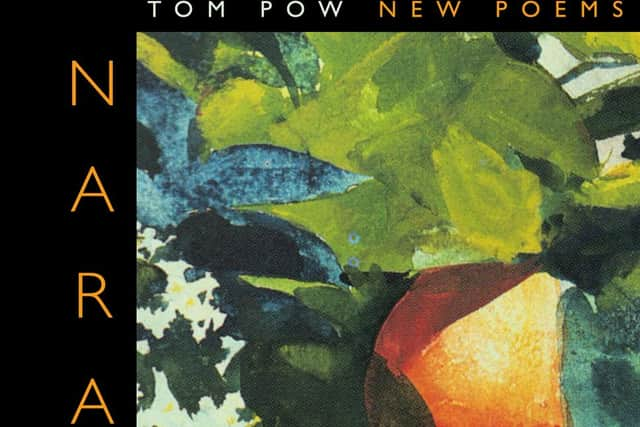Book review: Naranjas, by Tom Pow


Cats have an illustrious history in poetry, from TS Eliot's vivid creations to Paul Muldoon's magnificently monickered duo, Pangur Ban and Pyewacket. There is also a very significant, unnamed cat in Tom Pow's new collection, Naranjas, although cat owners be warned: the series of three poems about her here will almost certainly bring tears to your eyes.
The first, "Deaf Cat", sets the scene: Pow's elderly mog has become so hard of hearing that, when she sleeps, "Not even a clap behind her ears / will stir her." In the second poem, "Cat Suite Finale", having reached a point where "food held no interest" the poet bows to the inevitable and takes her to the vet to be put down. In the third poem, "& Postscript", the poet looks out on his garden, now full of birds, and remembers the spots his cat used to frequent. That's the basic framework, and – as Pow himself concedes – in the grand scheme of things the death of an elderly cat is no great tragedy: "Terrible things were happening / in the world. This was certainly / not one of them."
Advertisement
Hide AdWhat makes this triptych so moving, though, is the way Pow makes it such an overwhelmingly tactile experience. In the first poem, as the cat gets older he notes how "In tune with her ways, we've changed / our behaviour. We still like / to scratch and stroke and knead / but, more than before, we'll brush / the side of her head, or the top / as if smoothing a child's hair." In "Cat Suite Finale" the poet describes how, right at the very end "I cradled your small head / on my palm as I wept"; and in "& Postscript" he describes beginning "gently to stroke / your soft ashes back / into the earth."


Every now and then, while reading a book of poems, you come across a line which suddenly feels like the key to understanding the whole, and in Naranjas there's a line like this at the end of "Deaf Cat." Pow is writing of the experience of looking into his cat's eyes: "There are lessons to be learned / from our deaf cat. Before the word, / there was touch; after, touch again."
That idea that there is a measure of wisdom to be found beyond language; that in order to understand the world we must engage all our senses, rather than relying simply on the orderly processes of rational thought, seems to suffuse the entire collection.
As its title suggests, "From the Museum of Sound" is a decidedly aural trip down memory lane; meanwhile, the humorous sonnet "In A Heatwave, Many Years Ago" perfectly encapsulates that sensation of "uncoiling" in the shade after a long, hot car journey.
Frequently, the poet concerns himself with how the visual arts can capture and distill sensory experience. In the title poem, he wonders whether a friend, or perhaps a partner, ended up buying a painting of a dozen or-so oranges being tipped out onto a table; then he writes of how, where he is now, in Seville, the smell of oranges "both sharp and sweet / perfumed the air, / as if their last gift / was to make it / blossom time again." Result: when he returns again to the painting, the oranges on the canvas seem suddenly much more real.
Similarly, in "The Birth of the Virgin" he considers the titular 1440 triptych by the mysterious "Master of the Osservanza" and makes us experience it physically: when a woman pours water into a bowl, "We hear the water, soft as breath"; and with food being prepared in a room close to the bedchamber, "The smell of firewood, of broth / and ointment spreads from room / to room." For Pow, paintings aren't simply visual representations but windows into a whole world of sounds and smells.
Advertisement
Hide AdAfter what will have felt like a year of sensory deprivation for many people, there could hardly be a more powerful invocation to get back out into the world and start experiencing it through all five of the senses.
Naranjas, by Tom Pow, Galileo, 135pp, £9.99
A message from the Editor:
Thank you for reading this article. We're more reliant on your support than ever as the shift in consumer habits brought about by coronavirus impacts our advertisers.
If you haven't already, please consider supporting our trusted, fact-checked journalism by taking out a digital subscription at https://www.scotsman.com/subscriptions